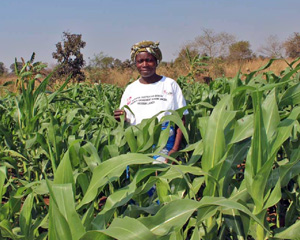Australia Africa Community Engagement Scheme (AACES) Annual Report 2011-12
Lonika shows her maize crop–a drought resistant variety that has increased her chances of a bumper harvest. Photo: CADECOM
Lonika Mvula lives in Dowa district of Malawi. Like many of her neighbours, she has struggled to survive due to the dry spells that have hit the region in the past decade.
Due to erratic rainfall, overdependence on maize, shrinking fish stocks, vanishing forests and land degradation, subsistence farmers such as Lonika are threatened with hunger, despite Malawi's targeted fertilizer subsidy programme.
As reported by Carsterns Malume the National Director of CADECOM, the local partner for Caritas in the Australia Africa Community Engagement Scheme (AACES) in Malawi, 'the current situation represents the worst food crisis since the 2001–02 droughts. This is because last season farmers had to replant thrice because of erratic rains. Inevitably, farmers ran out of seed and harvests were negligible.'
Yet, for farmers such as Lonika there is some hope. Lonika is a member of a farmer-to-farmer group in Nkhungulu village in Dowa, one of the 19 villages where CADECOM is implementing the AACES food security programme. At the demonstration camp farmers receive seed, share information and demonstrate better farming methods.
'I was lucky to receive seed last season which boosted my harvest. In addition, the information we learn from the demonstration plot has greatly improved my farming methods. My children now eat nutritious food and I get some surplus to sell,' says a beaming Lonika.
Lonika and other smallholder farmers in her village plant a variety of maize that is drought tolerant and mixes this with groundnuts, potatoes and cassava as insurance if the other crops fail. CADECOM has also taught farmers to use organic manure and irrigation techniques that have increased farmer's yields.
The lessons shared at the demonstration plot are spreading fast. The National Director for CADECOM calls it a 'multiplier effect,' with a potential to boost community resilience in the face of difficult times ahead.
CADECOM's program focuses on strengthening food security for over 8,000 people. This is achieved through provision of seeds, supporting extension services, establishing farmer-to-farmer support groups and encouraging the establishment of more than 60 demonstration plots for local farmers to improve their farming methods.
Australia Africa Community Engagement Scheme Annual Report 2011–12

